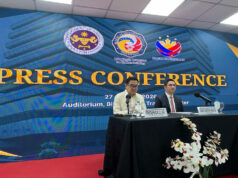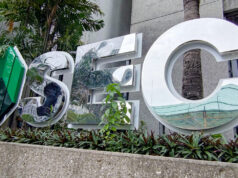Disinfection services demand spikes as business operations resume
By Jenina P. Ibañez, Reporter
DEMAND for disinfection and cleaning services is on the rise as businesses resume operations after the easing of lockdown measures.
However, the strong demand has put pressure on inventory of imported decontamination technology, which is now facing global shortages.
D&G Pacific Corp., a disinfection and waste management company, said it is experiencing a 25-30% rise in demand for disinfection services since the coronavirus pandemic began.
D&G Pacific President Edmund M. Dimalanta said in an online interview that operations for restaurant cleaning services stopped at the start of the lockdown, but growing demand for disinfection services from other industries offset any losses. The month of March saw the most demand since the company started two decades ago, he added.
“We’ve been getting calls from customers, friends, and I guess it’s even inquiries from our website. It’s non-stop. It’s from different industries — from hotels to buildings to maybe even car manufacturers. If we were to describe the business that knocks on our doors, it is the business that has high contact traffic,” Mr. Dimalanta said.
Happy Housekeepers, Inc., a home and workplace cleaning services provider, is also seeing more requests for deep cleaning and sanitation, vehicle sanitation, and workplace disinfection.
Iramor D. Lopez-Pozas, Happy Housekeepers, Inc. operations head, said in an e-mail that there has been a noticeable spike in inquiries from condominium residents.
“For business, the highest demand comes from supermarkets and convenience stores. Before the pandemic, they request services monthly. Now, they require a weekly service,” she said.
Meanwhile, a construction business that stopped operations during the lockdown added disinfection services to its portfolio. Construction management company Thaison Builders and Developers halted ongoing projects, but shifted operations to Firstline Sanitation Solutions (FSS).
“(It’s) a way to support our manpower so they can continue supporting their families despite the economic pause,” FSS Chief Executive Officer Arthur Cantor said in an e-mail interview.
The company offers disinfection packages, charging P50,000 for workplaces that usually have fewer than 40 employees, and P100,000 for those that employ up to 150. These packages include the service, disinfection materials, and employee training and monitoring, among others.
Products that were once mostly purchased by families with children, schools and hospitals are now being bought by various industries.
Intech Group Innovations Corp., the distributor of UV Care sterilization and air purifier products, sells its products to major mall operators in addition to outsourcing companies and office buildings. The products are advertised prominently in Ayala Malls’ online video on safety measures for mall goers.
Intech Chief Marketing Officer Carolyn Chuaying-Tanchen said in an online interview that the company is facing challenges in importing the products amid growing demand and global scarcity.
“There is also scarcity of products as well because it’s a worldwide need. So we are just only able to get what allocations are available and made to us. So that’s also one of the challenges that we had to face was the inventory coming in is very limited because of the production as well that is also trying to meet the demand worldwide,” she said.
The company is seeking regulation that will help penalize people selling fake products that advertise the use of UV-C, a type of ultraviolet radiation used for disinfection. They also hope the government would address difficulties in goods delivery to areas outside Metro Manila, as well as add their products to the list of goods that have fewer port limitations during the pandemic.
The importation of health and protective products designed to address the pandemic is exempt from all taxes and fees, but does not include UV Care’s products.
IS IT EFFECTIVE?
The effectiveness of these disinfection products and services in preventing the spread of the coronavirus disease 2019 (COVID-19) specifically is still being studied.
“We don’t know, really,” D&G’s Mr. Dimalanta said, explaining that they have researchers looking at global expertise and government regulations. He cited recommendations from the Health department, the World Health Organization (WHO), and the United States’ Centers for Disease Control and Prevention.
“There’s too much information from different parts of the world. It’s actually confusing…even among experts, even among the doctors, there is no one simple solution,” he added.
UVC has been effectively used against another coronavirus, SARS-CoV, but a recent study found that killing the COVID-19 virus in personal protective equipment required higher UVC exposure.
Various studies have shown how long the virus can remain on different types of surfaces.
The WHO on May 15 released guidelines on disinfection, saying there has to be adequate concentration of disinfectant solution to ensure its effectiveness and to reduce damage to surfaces.
“All touchable surfaces should be disinfected. Cleaning practices and cleanliness should be routinely monitored. The number of cleaning staff should be planned to optimize cleaning practices,” the organization said.



